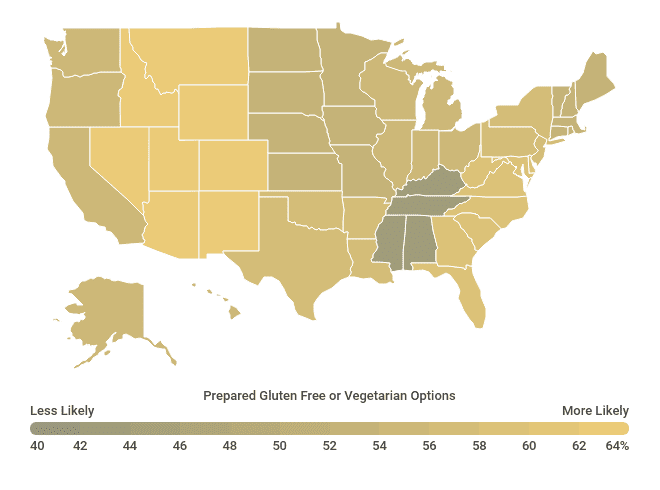Whether it’s by choice or necessity, many of us are particular about what we eat.
Some of that could be related to genetics — a dislike of cilantro, for instance, lactose intolerance, or having a bitter taste aversion that has us skipping Brussel sprouts. And in other cases, it might be someone just being a picky eater.
But whatever factors into a person’s food preference, it adds a little underlying stress for both host and guest during annual holiday meals. What happens when a vegetarian or gluten-free guest sits down at a host table filled with meat and wheat?
Holiday Stress
We wanted to know, so we went out and asked.
In a recent “United Plates” of America survey,* 23andMe asked both guests and hosts how they handle these delicate dietary demands.
One thing we learned is that holiday dinner planning ramps up tensions, with 64 percent of those surveyed saying it had them stressed out. This was particularly true in southern states that include Alabama, Kentucky, Mississippi, and Tennessee, where more than 80 percent of those surveyed said they were stressed by holiday dinner plans.

Making Accommodations
But we were surprised to learn that more people than you’d expect had options that could accommodate a gluten-free or vegetarian guest — in some parts of the US close to half of the respondents had that covered. Interestingly, the highest percentages of hosts who said they had food for gluten-free or vegetarians was not just out west, but also in the southern states of Georgia, the Carolinas, Virginia, and Florida.
More than half of those surveyed nationwide, 55 percent, said they could accommodate guests with food allergies, sensitivities, or preferences. But almost half of those surveyed, 49 percent, said if they had a food allergy or sensitivity, they wouldn’t ask a host to make special accommodations for them. About one in four said they didn’t want to offend the cook.

Taste Preference and Genetics
What’s also interesting from the survey is that most people in the United States don’t know that our food preferences and aversions are influenced by genetics. Only about a quarter of those surveyed, 24 percent, said they’d ever been told that your DNA played a role in dietary aversions or preferences.
Why is that so fundamentally important?
It seems obvious but what it tells us is that — as John Hayes, a scientist at Penn State, told The Guardian recently — genetics fundamentally alters how we perceive taste. We experience taste differently because of it. And it doesn’t just impact taste but how our bodies respond to food as well, just ask anyone who is lactose intolerant. Hayes’ made this point in talking about how different people react to the taste of cilantro, one of the most commonly used herbs in the world. Those who love it and those who hate it, are actually experiencing the taste in the same way. And yes, genetics plays a big part in whether we like it or not.
In a place as diverse as the United States, understanding and respecting that our differences in taste preference and aversions could go a long way toward understanding other kinds of differences as well. Happy Holidays!
*23andMe collaborated with SurveyMonkey for this United Plates of America Survey. Conducted between November 30 and December 1, 2021, the online survey included 1,050 nationally representative Americans ages 18+. It has a margin of error of +/- 3 percent.



